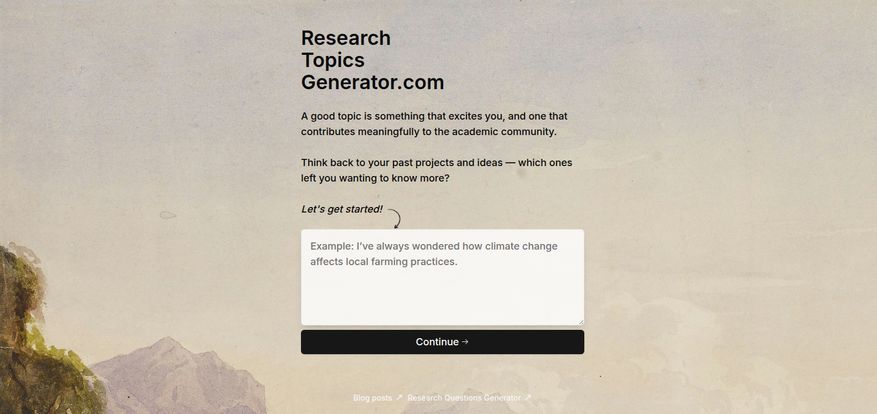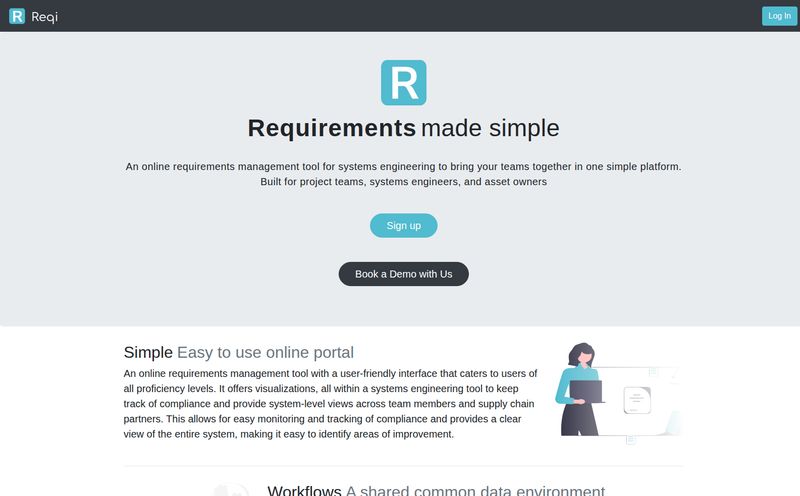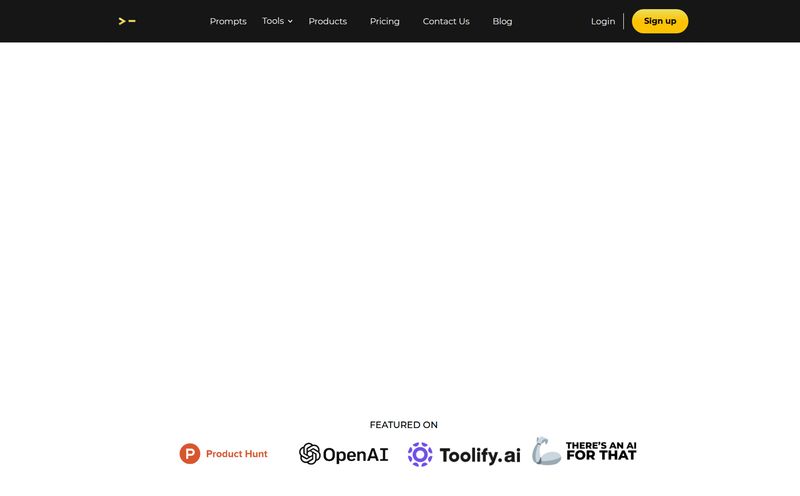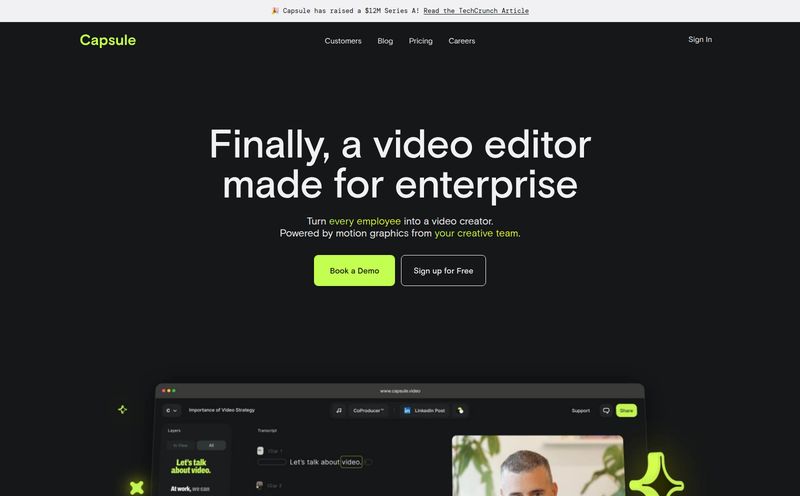We’ve all been there. The assignment is on the board, the dissertation proposal is due, and your brain, which was just buzzing with ideas in the shower, has suddenly become a barren wasteland. The cursor on the blank document blinks. Mockingly. It’s a unique kind of pressure, a blend of academic rigor and the deep, personal desire to not spend the next six months of your life studying something that bores you to tears.
For years, the process was a messy mix of frantic library searches, awkward conversations with professors, and way too much caffeine. But as with everything else, AI is starting to creep into this space. Recently, I stumbled upon a tool with a very straightforward name: ResearchTopicsGenerator.com. My inner SEO-nerd and former grad student was immediately intrigued. Is this just another generic content spinner, or could it actually be a useful muse for the academically paralyzed? I had to find out.
So, What's the Big Idea Behind This Tool?
Let's be clear from the get-go. This isn't a magic-eight ball that will spit out a perfectly formed, peer-reviewed-ready thesis title. And thank goodness for that. Instead, it positions itself as a partner in reflection. The homepage doesn’t ask for keywords. It asks you to think. The prompt says, “Think back to your past projects and ideas — which ones left you wanting to know more?”
That right there is a different approach. It’s an AI tool designed to generate ideas, yes, but it grounds the process in your own curiosity. It’s trying to help you find a topic that excites you and can contribute something meaningful. A novel concept, I know. It's built for students and academics who need a spark, a little nudge in a new direction, rather than a fully built vehicle.
My First Spin and How It All Works
The user experience is, and I say this with a sigh of relief, ridiculously simple. You land on the page, and there it is. A clean, calming, almost sepia-toned interface with a single text box. No pop-ups. No mandatory sign-up. No credit card required. Just a space for your thoughts.
To give it a fair test, I channeled my past academic self. I typed in a vague, half-formed thought I once had: “I’ve always been interested in how classic literature is being adapted into modern streaming series and what gets lost in translation.”

Visit Research Topics Generator
I hit 'Continue' and waited. A few seconds later, it served up a handful of more structured, academic-sounding starting points. They weren't perfect, but they were… interesting. They took my fuzzy idea and gave it some shape, suggesting angles I hadn’t considered, like the economic drivers behind these adaptations or their impact on literary canon.
The Good, The Bad, and The Intriguing
Like any tool, it’s not without its quirks. You’re not going to get a flawless dissertation topic on your first try. But after playing around with it for a while, a clear picture of its strengths and weaknesses emerged.
Your New Brainstorming Buddy
What I love about this is its power to shatter writer's block. It's like having a very patient, slightly eccentric professor on call 24/7. You throw a thought at the wall, and it throws a few structured ideas back. This simple back-and-forth is often all it takes to get your own creative gears turning. It’s a fantastic starting point. You get a list of potential directions, which you can then refine, combine, or use as a springboard to an entirely new idea. The simplicity is a huge plus. In a world of overly complex SaaS platforms, this single-task tool is a breath of fresh air.
A Necessary Reality Check
Now for the other side of the coin. The quality of the output is directly, and I mean directly, tied to the quality of your input. If you type in “history,” you’re going to get some comically broad and useless suggestions. The tool is an amplifier for your own reflection, not a replacement for it. Think of it as an intellectual Rorschach test; the insights you gain depend heavily on the thoughts you bring to it in the first place.
Also, the AI isn’t a mind reader. Some of its suggestions might feel a bit left-field or not quite aligned with what you were thinking. That's okay! My advice is to treat these oddball suggestions not as failures, but as creative prompts. Sometimes the most interesting research comes from connecting two seemingly unrelated fields.
Who Is This Tool Really For?
I see a few clear winners here. First, the undergraduate student who's been given their first major research paper assignment and has no clue where to start. This tool is a godsend for them. Second, the Masters or PhD student in the early stages of a proposal, trying to narrow a broad field of interest into a tangible, researchable question. It can help you see your field from a slightly different perspective.
Who might not get much from it? If you're a seasoned academic with a very specific, niche research program already established, this might be a bit too basic for you. It’s for ideation, not deep-level literature synthesis or methodology design. It's the first step in a long marathon.
And The Price Is… Right?
This is often the sticking point, isn't it? Well, from everything I can see, Research Topics Generator is free. There’s no pricing page, no subscription model, no hidden fees. I even hunted around for a 'Pro' version and came up empty (though I did find a 404 page for their blog, which gave me a chuckle). For students and academics, who are often working with tight budgets, this is a massive advantage. It's a genuinely helpful resource offered without a paywall, and in my book, that's a huge win for the academic community.
Final Thoughts: A Muse in a Box
So, what’s my final verdict? I'm pleasantly surprised. Research Topics Generator isn't a replacement for hard work, critical thinking, or deep engagement with your subject matter. It won’t write your paper for you. But it was never meant to.
What it does, and does well, is act as a digital muse. It’s a tool for breaking inertia. It prompts you, prods you, and provides just enough structure to turn a vague flicker of curiosity into the foundations of a real, exciting research project. If you’re staring at that blinking cursor, give it a try. The worst that can happen is you spend five minutes thinking about what truly interests you. And that’s never a waste of time.
Frequently Asked Questions (FAQ)
- Is Research Topics Generator really free to use?
- Yes, based on our review of the website, the tool is completely free. There is no sign-up required and no pricing information listed, making it an accessible resource for all students and researchers.
- How does the AI actually generate the topics?
- It uses your initial input—a reflection on your interests or past projects—as a seed. The AI then analyzes this input and generates several more structured, academic-style topic suggestions that expand upon or reframe your original idea across various potential angles.
- Can I use the generated topics directly for my paper?
- It's not recommended. You should view the generated topics as a starting point or inspiration. They will almost certainly need to be refined, narrowed, and checked for viability and existing literature before being used as a final research topic.
- What kind of input provides the best results?
- The more specific and thoughtful your input, the better. Instead of a single word like "psychology," try a full sentence that captures your curiosity, such as, "I'm curious about the psychological impact of social media 'like' buttons on teenage self-esteem."
- Is this tool useful for all academic fields?
- While it's versatile, its strength lies in fields that are open to interpretation and varied angles, like the humanities, social sciences, and some interdisciplinary sciences. For highly technical or formulaic fields, its utility might be more limited to brainstorming broader project directions.
- Do I need to create an account to use the generator?
- Nope. One of its best features is its simplicity. You can visit the website and start using the tool immediately without any need to sign up or provide personal information.
References and Sources
- Research Topics Generator Official Website: https://researchtopicsgenerator.com
- Boice, R. (1990). Professors as Writers: A Self-Help Guide to Productive Writing. New Forums Press. (A classic resource on overcoming academic writing blocks).



